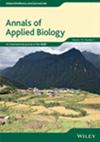Marina E. Battaglia, Sergio I. Martinez, Fernanda Covacevich, Verónica F. Consolo
求助PDF
{"title":"Trichoderma harzianum enhances root biomass production and promotes lateral root growth of soybean and common bean under drought stress","authors":"Marina E. Battaglia, Sergio I. Martinez, Fernanda Covacevich, Verónica F. Consolo","doi":"10.1111/aab.12909","DOIUrl":null,"url":null,"abstract":"<p>Drought stress (DS) is one of the main environmental stresses that determines crop productivity. It has been estimated that DS depresses over 40%–60% of soybean (<i>Glycine max</i> (L.) Merr.) and common bean (<i>Phaseolus vulgaris</i> L.) production worldwide, respectively. Although different agronomic strategies are sometimes implemented, the current goal in sustainable agriculture could involve the inoculation with native microorganisms to mitigate DS effects. A potential fungal candidate is <i>Trichoderma</i>, which is recognized as a ubiquitous soil inhabitant with growth-promoting and biocontrol potentiality. However, its potential for mitigating the stress for water deficit is less well-documented. Our objective was to evaluate the effect of inoculation with native <i>Trichoderma harzianum</i> strains on soybean and common bean growth under contrasting conditions of water availability. Seeds were independently inoculated (or not) with IB-J15 and IB-363 strains, and plants were submitted to DS or were kept under optimal irrigation (well-watered, WW). In both legumes, the most evident effect after being inoculated was the modification of plant root architecture, the increase in root area and the development of lateral roots in plants under WW and DS conditions. In soybean, both <i>Trichoderma</i> strains had a positive inoculation response, both fresh and dry root biomass increased under WW, and remarkably under DS conditions. The main effect was an increase of about 110% in root dry weight under WW and, about 330% in DS in plants inoculated with IB-J15 strain, meanwhile, plants inoculated with IB-363 increased root dry weight 60% in WW and 177% in DS conditions. Notably in soybean, the inoculation with both <i>Trichoderma</i> strains increased the root area more than 70% in both WW and DS conditions. Common beans inoculated with IB-363 under WW conditions, reached a positive inoculation responsiveness of around 247% in shoot dry weight biomass, and under WW both strains increased the root area more than 50%. Further, IB-363 increased leaf area by 25% in WW and 72% in DS. Additionally, the in vitro co-culture between both <i>Trichoderma</i> strains and nodulating <i>Rhizobium etli</i> and <i>Bradyrhizobium japonicum</i> E109 showed compatibility between microorganisms, since no inhibition of their growth was observed. We emphasize that plants inoculated with <i>Trichoderma</i> showed better resistance to water deficit, as seen by redistribution of photosynthates, prioritizing mainly, the development of the root system. © 2024 Association of Applied Biologists.</p>","PeriodicalId":7977,"journal":{"name":"Annals of Applied Biology","volume":"185 1","pages":"36-48"},"PeriodicalIF":1.8000,"publicationDate":"2024-05-01","publicationTypes":"Journal Article","fieldsOfStudy":null,"isOpenAccess":false,"openAccessPdf":"","citationCount":"0","resultStr":null,"platform":"Semanticscholar","paperid":null,"PeriodicalName":"Annals of Applied Biology","FirstCategoryId":"97","ListUrlMain":"https://onlinelibrary.wiley.com/doi/10.1111/aab.12909","RegionNum":3,"RegionCategory":"农林科学","ArticlePicture":[],"TitleCN":null,"AbstractTextCN":null,"PMCID":null,"EPubDate":"","PubModel":"","JCR":"Q2","JCRName":"AGRICULTURE, MULTIDISCIPLINARY","Score":null,"Total":0}
引用次数: 0
引用
批量引用
Abstract
Drought stress (DS) is one of the main environmental stresses that determines crop productivity. It has been estimated that DS depresses over 40%–60% of soybean (Glycine max (L.) Merr.) and common bean (Phaseolus vulgaris L.) production worldwide, respectively. Although different agronomic strategies are sometimes implemented, the current goal in sustainable agriculture could involve the inoculation with native microorganisms to mitigate DS effects. A potential fungal candidate is Trichoderma , which is recognized as a ubiquitous soil inhabitant with growth-promoting and biocontrol potentiality. However, its potential for mitigating the stress for water deficit is less well-documented. Our objective was to evaluate the effect of inoculation with native Trichoderma harzianum strains on soybean and common bean growth under contrasting conditions of water availability. Seeds were independently inoculated (or not) with IB-J15 and IB-363 strains, and plants were submitted to DS or were kept under optimal irrigation (well-watered, WW). In both legumes, the most evident effect after being inoculated was the modification of plant root architecture, the increase in root area and the development of lateral roots in plants under WW and DS conditions. In soybean, both Trichoderma strains had a positive inoculation response, both fresh and dry root biomass increased under WW, and remarkably under DS conditions. The main effect was an increase of about 110% in root dry weight under WW and, about 330% in DS in plants inoculated with IB-J15 strain, meanwhile, plants inoculated with IB-363 increased root dry weight 60% in WW and 177% in DS conditions. Notably in soybean, the inoculation with both Trichoderma strains increased the root area more than 70% in both WW and DS conditions. Common beans inoculated with IB-363 under WW conditions, reached a positive inoculation responsiveness of around 247% in shoot dry weight biomass, and under WW both strains increased the root area more than 50%. Further, IB-363 increased leaf area by 25% in WW and 72% in DS. Additionally, the in vitro co-culture between both Trichoderma strains and nodulating Rhizobium etli and Bradyrhizobium japonicum E109 showed compatibility between microorganisms, since no inhibition of their growth was observed. We emphasize that plants inoculated with Trichoderma showed better resistance to water deficit, as seen by redistribution of photosynthates, prioritizing mainly, the development of the root system. © 2024 Association of Applied Biologists.
在干旱胁迫下,哈茨真菌提高大豆和蚕豆根部生物量的产生并促进侧根生长
干旱胁迫(DS)是决定作物产量的主要环境胁迫之一。据估计,全球大豆(Glycine max (L.) Merr.)和普通豆(Phaseolus vulgaris L.)产量的 40%-60% 都受到干旱胁迫的影响。虽然有时会实施不同的农艺策略,但目前可持续农业的目标可能是接种本地微生物来减轻 DS 的影响。毛霉是一种潜在的候选真菌,它被认为是一种无处不在的土壤居民,具有促进生长和生物防治的潜力。然而,它在减轻缺水压力方面的潜力却鲜有文献记载。我们的目的是评估在不同的水分供应条件下接种本地毛霉菌株对大豆和普通豆生长的影响。种子分别独立接种(或不接种)IB-J15 和 IB-363 菌株,植株被置于 DS 或最佳灌溉条件下(良好灌溉,WW)。在两种豆科植物中,接种后最明显的效果是改变植物根系结构,增加根系面积,以及在 WW 和 DS 条件下植物侧根的发展。在大豆中,两种毛霉菌株都有积极的接种反应,在 WW 条件下,鲜根和干根的生物量都有所增加,而在 DS 条件下则显著增加。主要影响是接种 IB-J15 菌株的植株在 WW 条件下根干重增加了约 110%,在 DS 条件下增加了约 330%,而接种 IB-363 菌株的植株在 WW 条件下根干重增加了 60%,在 DS 条件下增加了 177%。值得注意的是,在大豆中,接种两种毛霉菌株后,根面积在 WW 和 DS 条件下均增加了 70% 以上。在 WW 条件下接种 IB-363 的普通大豆,其芽干重生物量的接种反应性约为 247%,而在 WW 条件下,两种菌株都能使根部面积增加 50%以上。此外,IB-363 在 WW 条件下可使叶面积增加 25%,在 DS 条件下可使叶面积增加 72%。此外,两种毛霉菌株与根瘤根瘤菌(Rhizobium etli)和日本稻米根瘤菌(Bradyrhizobium japonicum E109)的体外共培养显示了微生物之间的兼容性,因为没有观察到它们的生长受到抑制。我们强调,接种了毛霉菌的植物对缺水有更好的抵抗力,这体现在光合作用的重新分配上,主要是根系的发育。© 2024 应用生物学家协会。
本文章由计算机程序翻译,如有差异,请以英文原文为准。

 求助内容:
求助内容: 应助结果提醒方式:
应助结果提醒方式:


